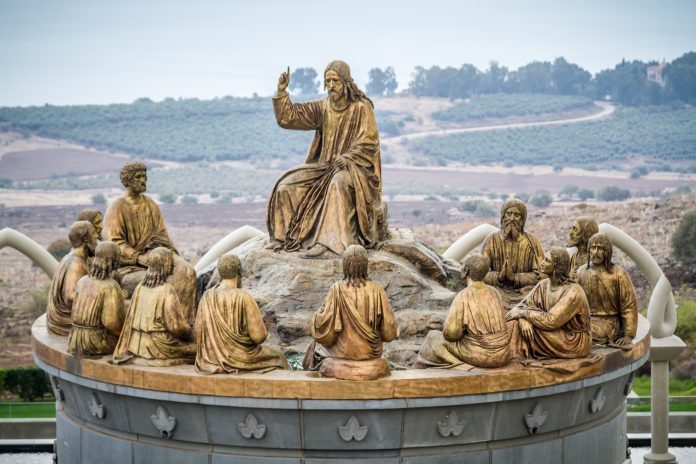
by Jeanne Heiberg
On my last birthday someone said to me, “This day is a time to check out your purpose in life—your calling, your vocation, why you arrived in this world with all your special gifts.” Because it’s so important to figure this out, I was happy to hear that we get more than one day to think about this, that the opportunity for insight extends to the week before and after your birthday, according to my source.
Just as we all have a birthday—the day we were born—we have a special reason for being here on this earth at this time.
It’s a Privilege to Be Called
Having a special purpose in life—a calling, a vocation—is a gift from God that comes with our birth and our Baptism. It’s a privilege—and it’s well worth our time and effort to discover and prepare for our vocation in life. We are not likely to be completely happy and fulfilled until we realize what our vocation is and follow it.
The Church gives special honor to all vocations because every single vocation, ultimately, involves a life of following Jesus.
For example, Jesus was often called rabbi or teacher. In those days, only very intelligent and gifted men could become rabbis, and when a rabbi said to a young person, “Follow me,” it was a great honor. That young person was being called to something very important.
When Jesus saw Simon (Peter), Andrew, James, and John casting and mending their fishing nets he said to them, “Follow me, and I will make you fishers of men” (see Matthew 4:18-22; Mark 1:16-20).
Jesus gave these men a new vocation built on—but better than—what they had been doing. They became great Apostles who spread the Good News of Jesus Christ, built the Church, and changed the whole world for the better. We do well to learn from them and follow their example. If you look for and discover your purpose in life—your vocation, your calling—you will be a happy person. You will do great things. You will help Jesus change the world for the better.
Vocations in Scripture
Scripture offers many accounts of divine calls. The great prophets Isaiah (see Isaiah 6:1-8) and Jeremiah (see Jeremiah 1:1-8), for example, were called by God. Although they argued with God at first, they finally said yes and fulfilled their missions.
And the great prophet Samuel was called when he was just a little boy. He was asleep in the Temple when he heard a voice calling his name. At first he thought it was Eli, the Temple priest, and so he ran to Eli to see what he wanted. Samuel did that three times until Eli realized that the Lord was calling the boy. He told Samuel to say, “Speak, Lord, for your servant is listening” (see 1 Samuel 3:3-10). Samuel later crowned two kings—Saul and David—and through them, the People of God were guided through difficult times.
Jesus’ mother, Mary, received a special call delivered by an angel, and she said yes and became the mother of Jesus (see Luke 1:26-38). The Samaritan woman whom Jesus met at the well recognized that Jesus was the Messiah and went to tell others about him (see John 4:7-30). After Jesus died on the cross, was buried, and rose from the dead, Mary Magdalene grieved at his empty tomb. When Jesus appeared to her, he called her name and sent her to go and tell the others the Good News (see John 20:11-18). On November 1 we celebrate the Feast of All Saints; we celebrate all the men and women throughout history who said yes to God’s call and made this world a better place.
We, Too, Are Called
We, too, are called to proclaim the Good News to others. That is part of every Christian vocation. We are called by God to a high purpose. Upon hearing the call, our instant response should be like Samuel’s: “Speak, Lord, for your servant is listening.” Even if we don’t understand our calling at first, God helps us to figure it out, often repeating it until we get it.
Some people are called to dedicate their whole lives to sharing the Good News with others and to guiding the People of God by entering the priesthood and serving God every single day in working for God’s kingdom, building the Christian community, reading and preaching God’s word, and bringing to God’s people the presence of Jesus in Communion. Men who are called to this vocation fulfill a high purpose indeed. They bring to the world great good and great blessings.
Some people are called to dedicate their whole lives to sharing the Good News as sisters and brothers and monks. They often live in community, pray together every day, and serve God by serving others in special fields such as education, medicine, and outreach to those who are in need. They, too, fulfill a high purpose indeed.
Men and women who get married have a very special mission to help each other live holy lives and to bring children into the world and raise them to follow Jesus. They become responsible for a whole new life. They have a special calling to raise children, to provide for them, and to love them with the love of Jesus. Married people are most happy and fulfilled when they rely on God and Jesus to carry out their calling. Married people, too, fulfill a high purpose indeed.
Some people choose a vocation of living as single people in the world. They find their calling to serve God according to their talents, gifts, interests, and inclinations. In the way they live their lives of service, they proclaim the goodness and love of God and the teachings of Jesus. They, too, fulfill a high purpose indeed.
A catechist friend told me that children find tiresome the often-asked question: “What do you want to be when you grow up?” Rather, it is better to help children understand that they have a vocation to love and share their faith with others right now, to help them think about the future and how they can use their gifts to the glory of God and the benefit of others, to teach them now to think and pray about their vocations, and to show them how to listen to the Holy Spirit as they imagine their future.
Everyone’s High Calling Today
In the times when Jesus walked the earth, and for many hundreds of years after that, rabbis and teachers were among the few who could read. This remained true throughout the early centuries of the Church. Priests, monks, and nuns would read Scripture to others and carry out many of the tasks that required literacy. Monasteries and convents are credited with keeping civilization, history, culture, and the arts alive through the Dark Ages.
With the invention of the printing press, more books gradually became available and so people developed a desire to learn to read. Today, with universal education, books, and a wide variety of other media, the responsibility and high calling to share the Good News extends to all of us.
Say to the Children
Every person has a purpose in life, a calling from God. One of our big jobs in life is to follow God’s calling, to find our vocation and purpose for coming into the world.
When you think about, prepare for, and then step up to claim your vocation in life, God honors your commitment with the growth, strength, and skills you need. God helps you to become your greatest and best self. God blesses in a special way those who wholeheartedly answer his call to give of themselves in the purposes to which they are called.
According to your students’ age and readiness, share with them some thoughts from the previous material that will help them think about their own vocations.
God has sent you into the world with wonderful gifts, talents, and inclinations. You can do good by loving others; creating and organizing things; solving problems; feeding, nourishing, healing, and teaching others; and so many other things. Are you good at smiling? If you are, you can smile a lot, as much as you can, to radiate joy and lift people’s spirits. Are you good at listening? If you are, you can listen to others carefully. People need to feel listened to; they want to know that what they say is important to others. Listening is a great gift. Are you good at talking and sharing thoughts, ideas, and stories? If you are, you can share happy, hopeful thoughts, give compliments, and use this gift to make others happy. What about arts, music, sports, writing, cooking? Through any of the skills you develop as you grow toward and into your particular vocation, God will work through you to build the Kingdom of God and make the world a better place.
Give each student a blank sheet of paper. Have students write in the upper left-hand corner “Things I Like to Do/Am Good At.” Under that heading, have them list their own special skills and interests. Next to each thing on their lists, have them draw a simple symbol that represents that skill or interest. In the upper right-hand corner, have them write “Needs of Others Near and Far.” Under that heading, have them list conditions in the world that they can work to correct, i.e., hunger, violence, homelessness, ignorance, etc. Then explain:
Now, take a minute to reflect on your chart and to think about how you can do good works and so be “fishers of others” and expand God’s kingdom of love on earth.
Vocation and Calling Craft
Have the children refer to their charts for the following craft.
MATERIALS
* dove pattern [CLICK HERE], copied to preferred size (or have children make their own patterns)
* white construction paper or light-weight card stock
* pencils
* scissors
* glue sticks
* thin nylon thread
* vocation-related images and words (love, life, care, explore, create, etc.) from magazines
PROCEDURE
1. Fold in half a piece of paper (larger than the dove pattern).
2. Place the head of the dove pattern at the fold and trace around it. Cut out the dove, making sure not to cut across the fold. This will create a “card.” The fold at the top of the dove’s head holds the back and the front together.
3. Draw a face on the head of the dove.
4. On the inside of the dove, draw pictures, symbols, or words (or use images and words cut from magazines) associated with various vocations. (Have students refer to the charts they drafted about their skills and interests and the needs of people near and far.)
5. Cut a piece of thin nylon thread to any desired length to create a hanging loop. Tape both ends of the thread to the “back” of the dove’s head.
Tips for symbols: Interlocking rings might represent marriage; a simple stole might represent the priesthood; a cross might represent the religious life; a heart with a cross in the middle might represent the single life. Brainstorm with student about images that represent various vocational activities in education, medicine, etc.
Vocation and Calling Prayer
This prayer is appropriate for the beginning of your lesson on vocations or right before the craft or as the closing of the class. On your prayer table, place a Bible with the readings marked (see Readings below).
Opening Song: “God Has Chosen Me.” Bernadette Farrell, ©1990. Found in Breaking Bread/Music Issue. Published by OCP.
Opening Prayer: Thank you, Lord, for all the wonderful gifts you have bestowed on the people gathered here. Help each of us to recognize our gifts and to use our gifts to bring your light and love to others. Help us to give generously of ourselves now, while we are in school. Help us to give generously of ourselves in the future—to our families, to our work, and to our communities. Help us to fulfill even now our vocation as Christians to bring the joy of God the Father, the love of God the Son, and the peace of God the Holy Spirit to those around us every day. Faithful to our calling and vocation, may we give you praise, honor, and glory, and find happiness in what we do.
All: Amen.
Readings: Jeremiah 1:1-8 (the Lord calls Jeremiah); 1 Samuel 3:3-10 (young Samuel hears God call him in the night); Luke 1:26-38 (Mary is called to be the mother of the Messiah); Matthew 4:18-22 (Jesus calls the disciples to be fishers of people)
Closing Prayer: Be with us, Jesus, as we search for and grow into our vocations, our callings. Help us to be open to you and the gentle whisperings of the Holy Spirit. You want the best for us, and you will help us to know our vocations and to be all that we can be.
All: Amen.
Closing Song: “Here I Am, Lord.” Dan Schutte, ©1981. Found in Breaking Bread/Music Issue, Published by OCP.
Jeanne Heiberg is the author of Advent Arts and Christmas Crafts (Paulist Press) and Advent calendars (Creative Communications). She is an artist, and has taught art, writing, creative catechetics, and meditation. She has taught all ages, from Pre-K through college and adult education, and has directed parish catechetical programs.
Copyright 2013, Bayard, Inc. All rights reserved. This article is protected by United States copyright and other intellectual property laws and may not be reproduced, rewritten, distributed, redisseminated, transmitted, displayed, published or broadcast, directly or indirectly, in any medium without the prior written permission of Bayard, Inc.
This article was written by the Catechist Staff and appeared in Catechist magazine, February 2013.
Image Credit: alefbet/Shutter Stock 559112293




